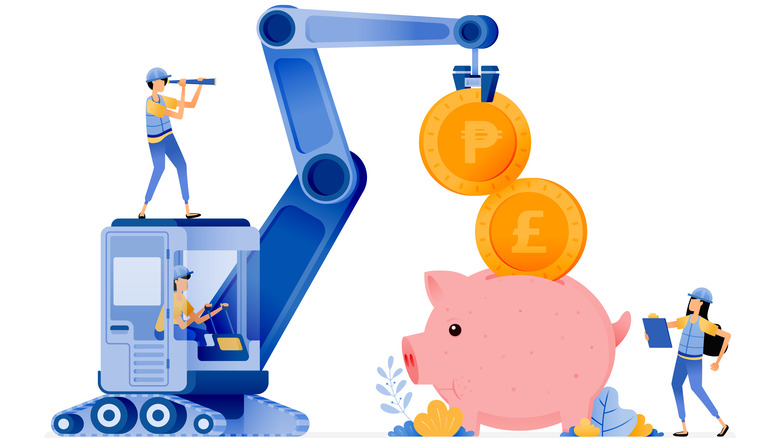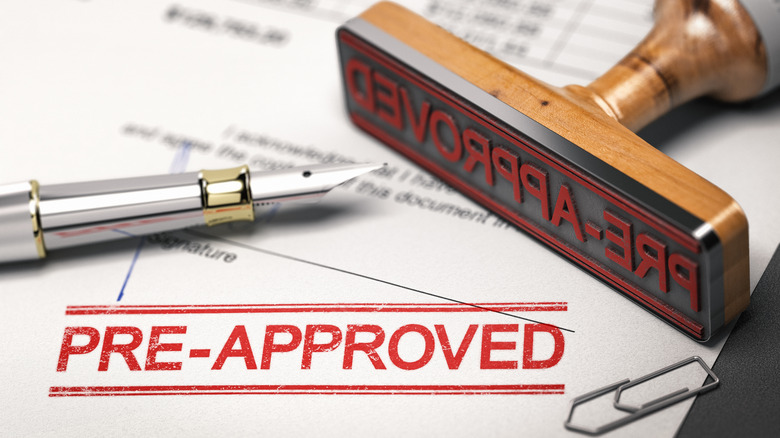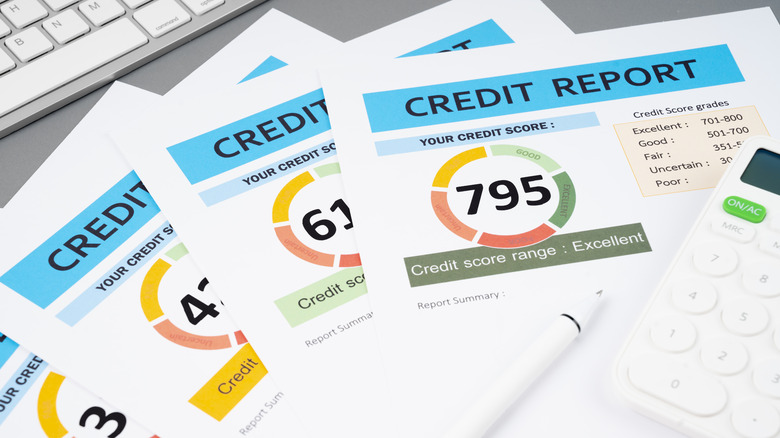12 Simple Tricks To Improve Your Credit Score
With credit scores that fluctuate on a routine basis, everyone has seen a number that was lower than expected or perhaps even stood as a cause for concern. Credit scores are often roundly misunderstood as the result of all the different factors that play a role in the single number that consumers and financial institutions get to see. To make matters even more complex, there are varying score models and even a range of additional specialized scoring methods that lenders use to determine borrower eligibility and lending criteria.
Coming to grips with the primary factors that influence your credit score is the first step in working to improve it, but once you've made sense of credit utilization, credit mix, and some of the other major facets of your score, you'll want to take a few key steps. Things like consistent on-time payments and beneficial lending arrangements like a credit builder loan can make a big difference in your quest to achieve a great credit score. Not every avenue for credit building has to involve long-term thinking, and a few strategies can be leveraged instantly for rapid improvement. These are simple tricks that you can use to impact your credit score positively.
Use a secured credit card to establish trust
One of the most reliable ways to build credit and improve your score is through a secured credit card. Secured cards are a different kind of financial product than a traditional line of credit. Instead of being given a revolving loan that then needs to be repaid when you use it, a secured card deducts funds from a reserve that you deposit into before purchasing things with the account. A secured card with a $500 limit, for instance, requires you to deposit $500 with your lender and then pay it back into the account every month after using it.
This tool is a great way to responsibly learn the ropes of using a credit card and is often something that first-time users will apply for when looking to build a credit history. Secured credit cards can also be an invaluable tool for someone looking to rebuild their credit after filing for bankruptcy or any other type of damaging activity has wrecked their credit score. A secured card is the perfect avenue for a borrower looking to start on the right foot or rebuild trust among financial institutions after finding themselves in a bit of hot water with their finances. The deposit required to use a secured card is a great motivator to keep the account in good standing and it acts as a fantastic lever on your credit score as you look to improve it.
Never miss a payment
Missed payments are a surefire way to see your credit score start to drop. Indeed, a missed payment won't necessarily result in an immediate reduction in your credit score or even trigger a report to credit bureaus, alerting them to the fact that you've failed to pay your bill or paid late. However, the consequences of missing a payment or submitting it after the deadline often result in knock-on effects that lead to a declining credit score.
First of all, late payments typically result in late fees that increase the amount you owe on the debt. Similarly, some credit card agreements stipulate that a missed payment can or will result in a reduction to your total line of credit or even an increase in your interest rate. An increased interest rate has the same negative impact on your ability to keep up with future payments and will make the debt more expensive over the long term. A reduced credit limit, on the other hand, may result in at least a small dip in your credit score. Part of the math surrounding your score is credit utilization. A reduction in the funding you have available as a result of this change will alter that credit utilization rate.
Use automated bill pay options
Automating your credit card bills and any other contributions you make to repay loans is a great way to avoid missing payments. Setting an autopay transaction can also help you hasten your repayment strategies. It's possible to set this payment to come out for the exact amount of your minimum payment, but you could also change this figure to a preset number or even configure two payments to be withdrawn from your account with the first as a minimum payment to cover your required contribution and a second autopay transaction to add an extra payoff figure on the top. Even if you just set a second payment for an additional $20, you can save a sizable amount on interest over time and speed along your journey to becoming debt-free.
With this strategy, it's a good idea to space out your payments rather than setting them both for the same time. Using the auto pay function, you could automate repayments on your credit card account to coincide with the date that you are paid every other week. Utilizing two monthly payments in this way results in a lower running average balance throughout the month and can save you a bit of money on the interest calculation with each new bill.
Register to vote
Registering to vote is an easy way to increase your credit score. Credit bureaus and new lenders will be looking to verify exactly who you are as you continue your credit journey. For those who aren't registered to vote, adding this identifying information into the mix can help create a more established legal presence associated with your name and other personal information. Moreover, registering to vote is a civic rite of passage that everyone should engage in, regardless of their politics or policy preferences. Whether you align with a major political party or not, there's a sort of moral responsibility associated with registering to vote and letting your voice be heard come Election Day.
The reality is that registering to vote adds another layer to the paper trail of who you are as an individual. It's incredibly easy to do and will ensure that your information is up to date and readily available when you want to apply for lending products in the future. Similarly, if you are already registered and have moved you should update your information so that the most recent address is on file. It's also possible to reregister while changing your party affiliation or even becoming a voter with no party listed if that's something that suits your politics.
Forget about applying for new lending products for a while
Another tactic borrowers must engage in when planning for long-term financial goals is the use of restraint. Limiting credit card spending or eliminating it for a short time can help turn the tide in your favor when it comes to reducing debts and building credit quickly. But this isn't the only restraint that can help boost your credit score.
Hard credit inquiries occur when a lender makes an official request to credit bureaus for your credit report. This happens when you apply for a new line of credit or any other financing product for consumer goods or larger purchases like a home or car. The number of hard pulls that have been made on your credit report in the last two years is something that influences your score. The more times you've applied for funding, the more negative weight this factor brings to bear. If you're hoping to improve your credit score, then avoiding applying for new cards or other lending products can make a big difference. This is especially important for anyone planning to purchase a home with the help of mortgage funding in the near future. If you can, don't apply for any new lending products and allow the two-year window from your last application to lapse before approaching mortgage lenders. This restraint will allow this scoring factor to weigh heavily in your favor rather than against you.
Take advantage of free credit monitoring services
Credit monitoring services are an easy way to protect yourself from fraudulent activity. Credit card fraud and other forms of financial fraud are rampant issues in the U.S. marketplace. 1.4 million people reportedly had their identity stolen in 2023, and nearly 400,000 occurrences of credit card fraud specifically were reported. Cybercriminals who steal credit card information aren't looking to help you build your credit, but rather open up accounts and purchase as much stuff as they can before the activity is flagged as suspicious. They obviously won't have any interest in repaying these debts, and if you don't have any way of identifying fraudulent activity in your name an account opened up by a criminal may ultimately start accruing missed payments and interest on potentially large balances that severely damage your credit score. Credit monitoring services alert you to any new accounts opened in your name. With this feature in play, you'll be alerted rapidly to the fact that someone has stolen your information and may be racking up debt on your behalf. Armed with this knowledge, you can move quickly to get the account closed and information scrubbed from your credit reporting.
There are plenty of companies out there that offer credit monitoring services, and many credit card issuers will provide you with free monitoring to help you keep a handle on your financial data. There's no need to pay for this service since free providers can be found in abundance.
Negotiate with your lenders
Negotiating with lenders is an often overlooked strategy that can pay dividends for a borrower struggling with high interest rates or extreme loan balances. Many credit mentoring services offer negotiation action as part of their debt management toolbox. With this approach, you'll start paying the credit mentoring provider rather than your credit card companies. Then they will work to settle your debts for prices lower than the total balance owed. Included in these payments are fees that the credit mentoring provider will keep. These types of service providers often suggest that they are uniquely positioned to negotiate on your behalf. However, the reality is that an individual can negotiate directly with their credit card company without having to pay additional fees or rely on third-party services that will wreck their credit score in the process.
If you're having difficulty managing your monthly payments or are saddled with an outrageously high interest rate, the best course of action that you have at your disposal is simply to pick up the phone and call the number on the back of your card. Credit card issuers are often more than willing to work with their borrowers. Indeed, you may have less success in getting some of your debt discharged with a settlement price, but plenty of options are on the table when you reach out to your card issuer including alternative repayment plans, lower interest rates, and more.
Consider a credit builder loan
Credit builder loans are a unique financial product that people with poor or limited credit can take advantage of to great effect. Credit builder loans are prearranged savings accounts that financial institutions set up on behalf of "borrowers." Instead of borrowing money to pay for something or to leverage as a line of credit, funds are deposited into an account and then the borrower pays back the financial institution. This product is reported to credit bureaus as if it were a traditional loan but in reality, the arrangement is just a means of saving money while building credit.
Credit builder loans have a withdrawal figure attached to them and once you've paid off enough money to reach that number you can start taking funds out of the savings account as if they were deposited into your ordinary savings fund. This arrangement requires you to make regular monthly payments as you would on any other lending product, but if you manage the loan diligently it can create an excellent boost to your credit score. Credit builder loans are particularly valuable to young consumers who might not have much credit history yet as well as those who are recovering from past credit management damage and are looking to rebuild trust with financial institutions.
Request a credit limit increase
An increase in your credit limit is a great way to immediately improve your credit score. Every credit card company has its own rules for how it handles limit increase requests, but generally speaking, you'll need to sport a usage history marked by responsible spending and a string of on-time payments. Similarly, credit card companies won't offer credit limit increases spaced too closely together. You'll want to wait at least six months before asking for another increase.
An increase to your spending limit does two things, with a third potential consequence. First of all, an increased credit limit means that your available credit will rise. A greater volume of available credit as well as the total line of credit extended to you factor into your credit score. A large line of credit isn't the only feature that's important here, however. With an increase in your credit line, you gain a boost to your credit utilization ratio. For instance, if you have a $10,000 total limit and have spent $4,000 across all of your cards, your utilization will stand at 40%. But if one of your lenders increases your limit by an additional $2,000 your total limit will rise to $12,000 and your utilization will immediately drop to 33%. Reducing your utilization plays a massive role in the calculation of your credit score. However, credit card users will need to be aware of the temptation to start spending more as their credit limits increase.
Consider credit boost services
Credit boost services are somewhat new in the world of personal finance. Essentially what this offers is the ability to add your utility bills, rent payments, and any other monthly payments you make, like those for Netflix subscriptions and other typical services that you might rely on, to your credit scoring model.
Routine household bill payments of all types can be factored into these services. One option is the Experian Boost, which claims to offer an average FICO score increase of 13 points after factoring in insurance, rent, and things like cable bills and internet service. There is a caveat here, though. For these payments to offer a positive net change to your credit score you'll need to routinely pay them on time. Using a credit boost service that adds late or missed payments to your credit history that wouldn't have been counted against you otherwise is a certain misstep. If these payments can be of assistance, the credit boost tool is a great option to push you just a little further up the credit scoring hill.
Use soft searches to check eligibility before sending in an application
Many people who use lending products in their daily lives have heard the terms "hard inquiry" and "soft credit search." A hard inquiry happens when a lender pulls your credit report to verify personal information and make a decision on whether or not to approve an application. Hard inquiries are placed on your credit report and remain there for two years. Soft searches on, the other hand, are not listed on your credit history and can be a real asset as you shop around for new rewards credit cards, mortgage lenders, or any other type of personal finance product in this space.
Anyone who has seen pre-approval information before deciding on a new credit card will be at least somewhat familiar with the soft search process. If you've been pre-approved for a card or are shopping around and have seen a page that suggests your chances of being approved — sometimes in the form of a percentage — then you have been the beneficiary of a soft credit check. These searches allow you to get a sense of whether you'll be approved before committing to a hard credit check. Applying for a new lending product only to be turned down essentially wastes one of these valuable hard pulls, especially if you haven't had any in the last two years (or if you have been exceedingly active). Using this alternative approach allows you to manage your credit history and score more effectively.
Ask for credit reports from all three credit bureaus each year
Finally, but perhaps most importantly, every consumer in America should request their credit report from all three credit bureaus each year. The bureaus are Experian, TransUnion, and Equifax, and all three are required by law to provide consumers with one free copy of their credit report per year. Checking your credit report allows you to identify fraudulent activity and any mistakes or errors that might be hiding in your credit history. Identifying issues and taking action to fix them is an important component of the modern credit management landscape.
The best course of action here, in tandem with free credit monitoring services, is to request one credit report from each of the three bureaus per year at an interval spaced out every four months. This means that every four months you'll see an updated credit report that lists all of your liabilities and open accounts. As a result, even if your monitoring service lets something fall through the cracks you can check your credit report personally at multiple times throughout the year and consistently. There's no reason not to ask for these reports and having one generated and delivered to you doesn't count as a hard inquiry so there is no effect on your credit score by taking this course of action. It's an essential task.












